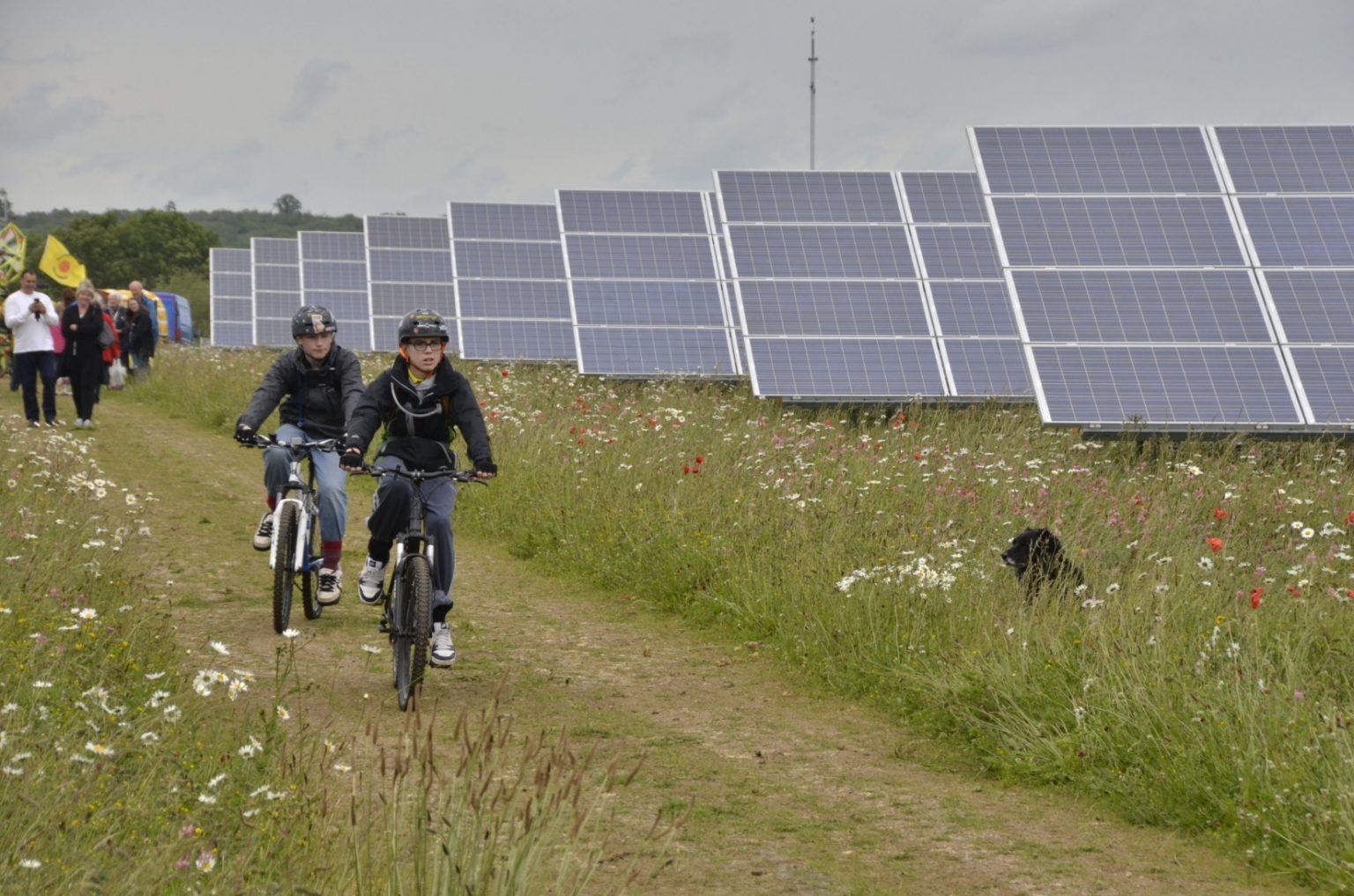A new opinion poll of 2,000 adults reveals more than two thirds of the public support renewable energy schemes where projects are undertaken at a community level and local people receive financial benefit, writes Oliver Tickell, contributing editor at The Ecologist. The support even extends to wind and solar farms close to people’s homes.
An overwhelming majority of the public would support local renewable energy projects, including wind turbines, if they were owned and controlled by the community, the survey commissioned by Co-Operative Energy finds.
More than two-thirds – 67 percent – of the 2,000 UK adults polled by ICM last month said they would support local community-owned renewable energy projects such as solar panels and wind turbines, with just 8 percent in opposition.
This includes not just Labour, Liberal Democrat and Green Party supporters, but also those who identify as Conservatives. Support among Conservative voters increased from 62 percent in 2015 to 65 percent in 2016.
A staggering 78 percent of the public thought that the Government should do more ‘to help local communities generate their own energy, with profits staying in the area’. Just 6 percent opposed this. Again, support among Conservative voters increased, from 73 percent in 2015 to 76 percent in 2016.
Two-thirds (68 percent) of respondents say that they are prepared to pay a small surcharge each year on their energy bill to fund an expansion of community energy, with just 15 percent opposing this.
Government Support for Community Renewables
The findings directly challenge the Government’s recent decisions to slash subsidies for small, local renewable energy schemes and to bar investors from access to social investment tax relief.
While 58 percent believe that the Government should change its mind and once again offer tax relief to those individuals who take the risk of investing in community energy, with just 12 percent against. Backing for these measures was higher still among Conservative supporters.
More generally, more than half (52 percent) of those surveyed said they would support a wind turbine within two miles of their home – nearly three times as many as the 18 percent who would oppose it. Support among Conservative supports increased from 43 percent in 2015 to 47 percent in 2016.
Support for solar farms was even more overwhelming: with 61 percent of the public supporting a project within two miles of their home, and just 11 percent against.
Ramsay Dunning, Managing Director at Co-operative Energy, which commissioned the research, said: “This poll shows that the Government’s recent hostility to further growth in onshore wind turbines and solar farms is out of kilter with the vast majority of the UK public, including Conservative Party supporters.
“Moreover, people want to see growth in local, community-owned projects and are willing to pay a small surcharge on their bills to help this happen.”
Just 25p per Year Could Finance Huge Expansion
Co-operative Energy and the Energy Savings Trust have previously calculated that for just 25p per customer per annum, the UK could grow its community energy capacity from 200MW to 3,000MW in a few short years.
That enormous potential gives the newly formed Department for Business, Energy and Industrial Strategy (BEIS) and its ministers “a fantastic opportunity to tap the public’s goodwill and provide a significant boost to the UK‘s social enterprise economy”, Dunning added.
Co-operative Energy launched in 2010 and now has over 250,000 customers, over half of them Co-operative members, and over 500 colleagues. It is part of The Midcounties Co-operative, the largest independent Co-operative in the UK.
A primary aim of Co-operative Energy is to drive the expansion of community energy generation projects. For example, it provides a secure market for community energy through ‘power purchase agreements’ with projects in the sector.
Supported community energy projects range from co-operatives through to charitable trusts and crowd-sourced debt offerings. Supported technologies include wind, solar PV and hydroelectric.
Igniting an Energy Revolution
Will Dawson, Chair of the Community Energy Coalition and Head of Energy at Forum for the Future, said: “As we embark on the fourth Community Energy Fortnight from 3-18 September 2016, I am really pleased to see support across political views grow even higher for communities owning and benefiting from their own energy projects.”
The Community Energy Coalition (CEC) was formed in 2011 by some of the UK‘s most trusted institutions including the Church of England, the Women’s Institute (WI), the National Union of Students (NUS), the National Trust, The Co-operative Energy, Community Energy England and Forum for the Future.
It aims to ignite an energy revolution which places communities at its heart. It strives for a clean, affordable and secure energy system for all, by helping communities across the UK to own, generate and save energy together.
“CEC members see a rapid switch to renewable energy communities and energy efficient homes and businesses as vital for Britain’s future”, said Dawson. “We want the government to stand with us and do more to help British communities take control of their energy locally.”
This article was originally published on The Ecologist.
Photo: Westmill Solar Park via Wikimedia Commons
Subscribe to our newsletter
Stay up to date with DeSmog news and alerts







